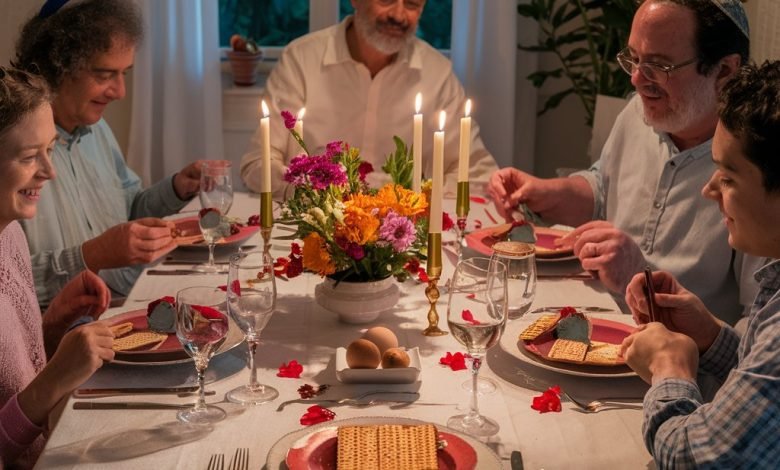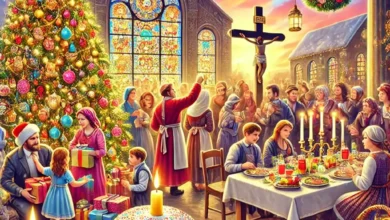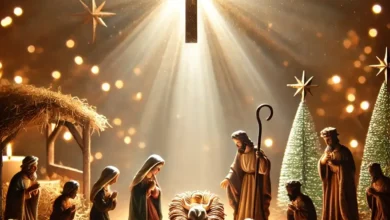
what’s Passover in the Bible?
Bible Verses about the Feast of Passover in the Old and New Testaments : Read Bible verses about the tradition of the Feast of Passover in both the Old and New Testaments. Learn how Jesus Christ is the ultimate fulfillment of the sacrificial lamb in the Feast of Passover, and how Christians now partake in the communion of His body and blood.
فرست محتوا
What is the Feast of Passover in the Bible?
The Feast of Passover in the Bible has its roots in the book of Exodus, where the Lord instructed Moses, Aaron, and the Israelites in Egypt to mark their homes with the blood of a lamb so that the Lord would “pass over” their homes and spare their firstborn. The biblical text is found in Exodus chapter 12.
Read more : 10 Names of God Every Christian Should Know
Feast of Passover or Passover
The Lord said to Moses and Aaron in the land of Egypt: “This month shall be for you the beginning of months. It shall be the first month of the year for you. Tell all the congregation of Israel that on the tenth day of this month every man shall take a lamb according to their fathers’ houses, a lamb for a household.
And if the household is too small for a lamb, then he and his nearest neighbor shall take according to the number of persons; according to what each can eat you shall make your count for the lamb. Your lamb shall be without blemish, a male a year old. You may take it from the sheep or from the goats, and you shall keep it until the fourteenth day of this month, when the whole assembly of the congregation of Israel shall kill their lambs at twilight.
Then they shall take some of the blood and put it on the two doorposts and the lintel of the houses in which they eat it. They shall eat the flesh that night, roasted on the fire; with Passover and bitter herbs they shall eat it. Do not eat any of it raw or boiled in water, but roasted, its head with its legs and its inner parts. And you shall let none of it remain until the morning; anything that remains until the morning you shall burn.
In this manner you shall eat it: with your belt fastened, your sandals on your feet, and your staff in your hand. And you shall eat it in haste. It is the Lord’s Passover. For I will pass through the land of Egypt that night, and I will strike all the firstborn in the land of Egypt, both man and beast; and on all the gods of Egypt, I will execute judgments: I am the Lord. The blood shall be a sign for you, on the houses where you are. And when I see the blood, I will pass over you, and no plague will befall you to destroy you when I strike the land of Egypt.
This day shall be for you a memorial day, and you shall keep it as a feast to the Lord; throughout your generations, as a statute forever, you shall keep it as a feast. Seven days you shall eat Passover. On the first day, you shall remove leaven out of your houses, for if anyone eats what is leavened, from the first day until the seventh day, that person shall be cut off from Israel.
On the first day, you shall hold a holy assembly, and on the seventh day, a holy assembly. No work shall be done on those days. But what everyone needs to eat, that alone may be prepared by you. And you shall observe the Feast of Passover, for on this very day I brought your hosts out of the land of Egypt. Therefore, you shall observe this day, throughout your generations, as a statute forever.
In the first month, from the fourteenth day of the month at evening, you shall eat Passover until the twenty-first day of the month at evening. For seven days, no leaven is to be found in your houses. If anyone eats what is leavened, that person will be cut off from the congregation of Israel, whether he is a sojourner or a native of the land. You shall eat nothing leavened; in all your dwelling places, you shall eat Passover.”
Then Moses called all the elders of Israel and said to them, “Go and select lambs for yourselves according to your clans, and kill the Passover lamb. Take a bunch of hyssop and dip it in the blood that is in the basin, and touch the lintel and the two doorposts with the blood that is in the basin. None of you shall go out of the door of his house until the morning. For the Lord will pass through to strike the Egyptians, and when he sees the blood on the lintel and on the two doorposts, the Lord will pass over the door and will not allow the destroyer to enter your houses to strike you.
You shall observe this rite as a statute for you and for your sons forever. And when you come to the land that the Lord will give you, as he has promised, you shall keep this service. And when your children say to you, ‘What do you mean by this service?’ you shall say, ‘It is the sacrifice of the Lord’s Passover, for he passed over the houses of the people of Israel in Egypt when he struck the Egyptians but spared our houses.’” And the people bowed their heads and worshiped. Then the people of Israel went and did so; as the Lord had commanded Moses and Aaron, so they did. (Exodus 12:1-28)”
The Lord’s commands regarding Passover appear again, with details on how to observe it after the Israelites’ exodus from Egypt, in other parts of the Torah (the first five books of the Bible). These include references in Numbers 9:1-4, Numbers 28:16-25, Deuteronomy 16:1-6, and Leviticus 23:4-8. These other references show that God did not intend for Passover to be a one-time event but as an annual festival wherein the Israelites would remember how God delivered them.
How Did They Celebrate Passover?
“These are the appointed feasts of the Lord, the holy convocations, which you shall proclaim at the time appointed for them. In the first month, on the fourteenth day of the month at twilight, is the Lord’s Passover. And on the fifteenth day of the same month is the Feast of Passover to the Lord; for seven days, you shall eat Passover. On the first day, you shall have a holy convocation; you shall not do any ordinary work. But you shall present a food offering to the Lord for seven days. On the seventh day is a holy convocation; you shall not do any ordinary work.” (Leviticus 23:4-8)”
The Feast of Passover begins with the Passover meal on the evening of the 15th of Nisan (in the Jewish calendar) and lasts seven days. These two feasts together commemorate Israel’s liberation from slavery in Egypt. The term Passover refers to the angel of death “passing over” the Hebrew homes marked with the lamb’s blood while striking down the firstborn of the Egyptians. Passover is a reminder of the haste with which the Hebrews left Egypt. This Passover was fulfilled in Christ, whose blood was shed to deliver humanity from the bondage of sin and death.
The Last Supper: Passover with the Disciples
Jesus Christ came to Jerusalem at least twice to observe the Feast of Passover. He came at the beginning of His ministry, cleansed the temple, and declared that if the temple were destroyed, He would rebuild it in three days (John 2:13-22). When Jesus came again and entered Jerusalem on a donkey, He and His disciples secured a private room to observe the Passover.
“And on the first day of Passover, when they sacrificed the Passover lamb, his disciples said to him, ‘Where will you have us go and prepare for you to eat the Passover?’ And he sent two of his disciples and said to them, ‘Go into the city, and a man carrying a jar of water will meet you.
Follow him, and wherever he enters, say to the master of the house, “The Teacher says, Where is my guest room, where I may eat the Passover with my disciples?” And he will show you a large upper room furnished and ready; there prepare for us.’ And the disciples set out and went to the city and found it just as he had told them, and they prepared the Passover.
And when it was evening, he came with the twelve. And as they were reclining at the table and eating, Jesus said, ‘Truly, I say to you, one of you will betray me, one who is eating with me.’ They began to be sorrowful and to say to him one after another, ‘Is it I?’ He said to them, ‘It is one of the twelve, one who is dipping bread into the dish with me. For the Son of Man goes as it is written of him, but woe to that man by whom the Son of Man is betrayed! It would have been better for that man if he had not been born.’” (Mark 14:12-21)”
Relationship Between Easter and the Feast of Passover
Passover (or Pascha) sanctified time and life for Israel as a sign pointing to the imminent incarnation of the Lord, Jesus Christ. During this festival, they were to remember Him and what He did to deliver them from Egyptian bondage. More importantly, it pointed to His coming in the flesh.
When John the Baptist introduced Jesus, he announced, “Behold the Lamb of God who takes away the sins of the world.” (John 1:29, 35-36)”
John the Baptist’s title for Jesus alluded to the fact that Christ would be the ultimate sacrifice, dying as the true Passover lamb, whose blood would shield His followers from eternal death and deliver them from bondage to sin.
The Last Supper Jesus had with His disciples was during Passover and commemorated the covenant of God with His people. Jesus, the Lamb of God, would shed His blood, establishing a new covenant of grace and forgiveness. The Christian sacrament of communion, also known as the Eucharist, is rooted in this Passover meal, symbolizing Jesus’ body and blood given for humanity’s salvation.





